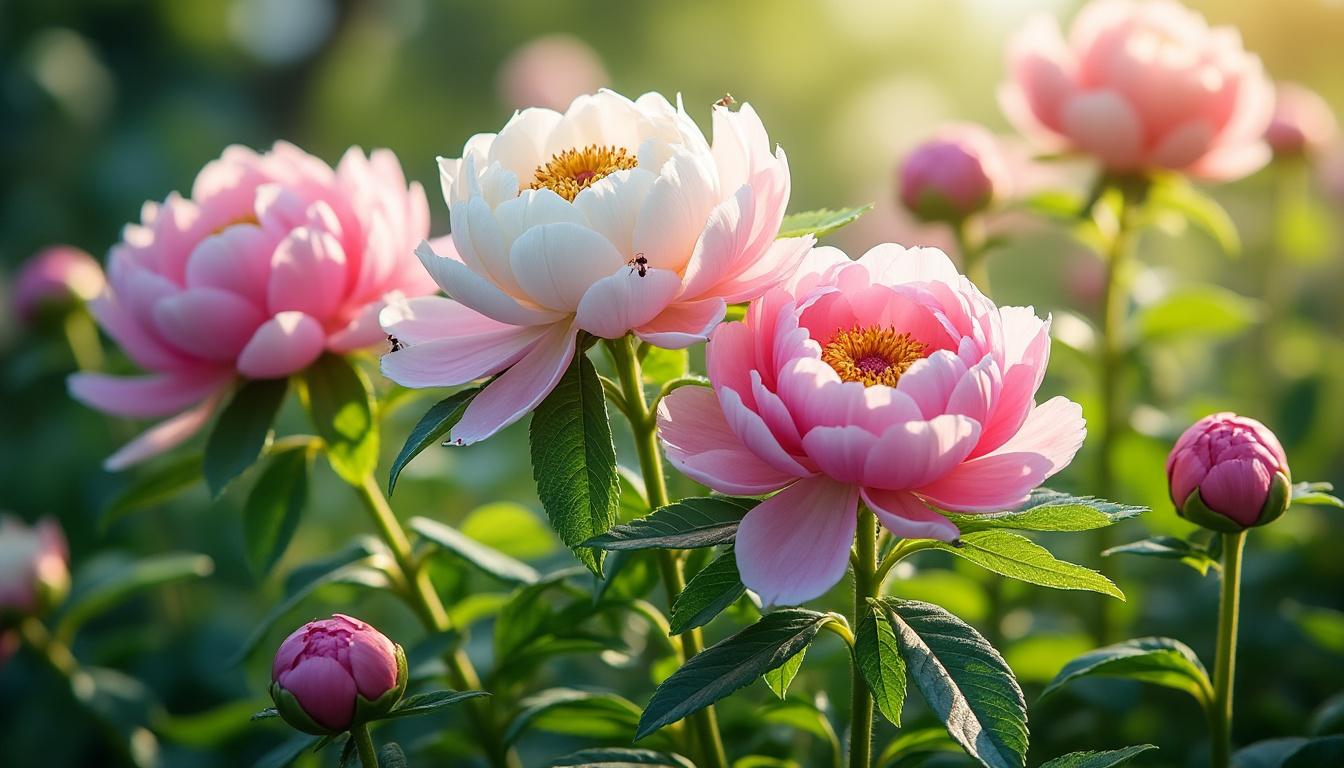Each spring, as gardens awaken and nature reclaims vibrant hues, a mysterious alliance quietly takes shape between ants and peonies. While many notice ants swarming over peony buds, this familiar sight springs from a fascinating ecological interaction often misunderstood. Rather than mere pests, ants serve as integral Nature’sHelpers within these floral ecosystems, offering unexpected benefits that assist peonies in thriving. Decoding this relationship deepens not only gardeners’ appreciation but also unveils how these BloomBoosters contribute to an intricate EcoSymbiosis that champions plant health and resilience.
The Mutual Benefits Behind Ants And Peonies In GardenHarmony
The sight of ants congregating on peony buds often leads to widespread speculation about their role. Contrary to popular myth, ants do not “tickle” peonies to open their petals but instead are attracted to the sugary nectar the buds secrete. This nectar is produced by the peony’s protective sepals and acts as a natural food source. Ants, as voracious seekers of sweetness, flock to this resource, engaging in an interaction recognized as a form of FloralFriendship.
This relationship is fundamentally mutualistic: while ants benefit from accessing the nectar, peonies gain from the protective services these insects provide. Ants patrol the buds and flowers, acting as vigilant bodyguards against harmful pests such as beetles, aphids, and thrips. These predators can cause extensive damage to delicate petals and stems, so the ants’ predation reduces infestations and improves overall plant health.
Garden experts and flower farmers, like those tending to over six hundred peony plants in Western New Jersey, observe this dynamic consistently during the late spring season. These AntGardens thrive because ants contribute to pest regulation and foster safer blooming environments, making it easier for peonies to flourish uninterrupted.
- Ants gain nourishment from the sweet nectar secreted by peony buds.
- Peonies receive natural pest control through ant predation on harmful insects.
- Reduced chemical intervention due to natural pest reduction, promoting sustainable gardening.
| Benefit | Ants | Peonies |
|---|---|---|
| Nectar Access | Primary food source for ants | None directly |
| Pest Defense | Patrol and consume pests | Protection of buds and blooms |
| Plant Health | Enhanced colony nutrition | Reduced pest-related damage |
This naturally occurring AntAssist mechanism exemplifies the benefits of GardenHarmony, where biological interactions replace or reduce reliance on pesticides, fostering healthier and more vibrant peony displays. Understanding this symbiosis redefines how gardeners view ants —transforming them from garden nuisances into valuable partners.
Debunking The Myth: Do Ants Help Peonies Bloom or Just Share Nectar?
Among gardeners and floral enthusiasts, several myths surround ants’ presence on peonies. The most enduring claim suggests ants are essential for peonies to open their tightly closed buds. However, horticultural experts assert that peony buds are genetically programmed to open regardless of ants’ involvement. The misconception likely stems from the visual phenomenon of ants inhabiting unopened buds and the observation that buds are sticky with nectar.
Research and anecdotal evidence from seasoned gardeners demonstrate that ants primarily seek the sugary secretion rather than actively assisting in petal expansion. Peonies exemplify FlourishFables where folklore met biology, giving rise to stories of ants “tickling” petals open, which oversimplify the true ecological roles.
Still, this sticky substance attracts ants in vast numbers, creating a spectacular display of buzzing activity. While this can be a concern for gardeners aiming to keep indoor bouquets ant-free, a simple technique such as dunking freshly cut peonies in water before arranging can minimize unwanted ant hitchhikers without disrupting the plant’s health benefits outdoors. (For more pest advice, see budget tricks to eliminate ants.)
- Peonies open naturally, ants do not influence bud blooming.
- Sticky nectar on buds attracts ants for food, not assistance.
- Dunking cut peonies in water reduces ants in indoor arrangements.
- Ants aid in pest control but are not necessary for flowering.
Adopting this understanding can alleviate gardeners’ worries about ant infestations linked to peonies and focus attention on the ecological benefits ants provide without exaggerating their role.
| Claim | Truth | Gardening Tip |
|---|---|---|
| Ants help peonies bloom | False – peonies bloom naturally | Use water dunk to remove ants from indoor flowers |
| Ants eat nectar from buds | True – nectar attracts ants | Do not overuse pesticides affecting ants |
| Ants harm peonies | False – ants protect against pests | Embrace ecological pest control |
Natural Pest Control And The Role Of Ants As PetalProtectors
One of the most critical contributions ants make to PeonyPartners is pest mitigation. Peonies often face threats from beetles, aphids, thrips, and other herbivorous insects that can severely damage young buds and mature petals. Ant colonies act as vigilant defenders, constantly patrolling their assigned peony patches.
By feeding on or driving away these pests, ants reduce the risk of infestations that would otherwise require chemical treatments. This interaction results in more robust, healthy plants that demonstrate improved resistance to disease and environmental stress.
This biological pest defense also complements sustainable gardening practices by decreasing the gardener’s dependency on pesticides, aligning well with current ecological gardening trends, including advice from summer garden yield tips that encourage natural pest control strategies.
- Ants prey on harmful insects affecting peony health.
- They reduce the need for chemical pesticides, protecting the environment.
- Ant surveillance decreases pest population growth and damage.
- Supports sustainable gardening and healthier peony cultivation.
| Pest Type | Damage To Peonies | Ant Defensive Action | Outcome |
|---|---|---|---|
| Aphids | Sap-sucking causes weak stems & wilting | Ants consume or deter aphids | Healthier stems, less wilting |
| Thrips | Feeding scars petals leading to discoloration | Ants disturb thrips feeding | Vibrant, unblemished blooms |
| Beetles | Chewing damages buds and leaves | Ant patrols deter beetles | Intact buds and foliage |
Incorporating ants as natural allies fits into a comprehensive gardening approach, ensuring peonies flourish with fewer inputs and greater ecological respect. This also reduces risks related to chemical exposure highlighted in sources like food safety for the 4th of July when outdoor gatherings and garden care coincide.
EcoSymbiosis And Soil Health: How Ants Contribute Beyond Peony Blooms
Ant activity extends beyond just bud protection. Their burrowing behavior aerates soil, creating channels allowing water and nutrients to reach plant roots efficiently. This subterranean maintenance improves soil texture and encourages microbial diversity, both essential for robust peony growth.
These soil improvements are a less conspicuous but equally vital dimension of the BloomBoosters role ants play within garden ecosystems. By enhancing soil quality, ants directly influence the health and longevity of peony plants, contributing to sustainable garden productivity discussed in winter gardening bliss articles highlighting year-round care strategies.
Additionally, ants transport organic matter and decomposed insects deeper into the soil, enriching nutrient cycles that promote vigorous flowering and healthy foliage development.
- Soil aeration by ant tunnels improves root oxygenation.
- Enhanced water retention from improved soil structure.
- Promotion of beneficial microbial activity supporting nutrient uptake.
- Distribution of organic nutrients accelerating soil fertility.
| Contribution | Description | Impact on Peonies |
|---|---|---|
| Soil Aeration | Tunnels formed by ant colonies improve oxygen flow | Healthier root systems, improved growth |
| Water Penetration | Channels increase soil’s ability to absorb moisture | Better hydration during dry spells |
| Nutrient Cycling | Organic material transported into soil | Enhanced bloom quality and durability |
Recognizing the broad environmental contributions of ants encourages gardeners to foster their presence as part of a balanced EcoSymbiosis essential to flourishing garden ecosystems, wrapping nature’s intricate threads into a cohesive, beneficial tapestry.
Managing Ants While Ensuring Peony Success: Best Practices For Gardeners
Despite the evident benefits of ants, some gardeners remain wary of their presence indoors or fear potential infestations. Strategic management can balance keeping ants outdoors where they support peonies while minimizing their intrusion indoors.
One effective approach includes rinsing cut blooms, as advised by horticulturists, thereby removing most ants attracted to nectar residue. Photography of ant-free floral arrangements can be achieved with simple preparation, ensuring the beauty of peonies is enjoyed without the inconvenience.
Gardeners seeking to protect both their plants and homes might also explore natural deterrents, avoiding chemical methods that disrupt FloralFriendship. Employing objects such as citrus peels or certain herbs around indoor vases creates unwelcoming environments for ants while safeguarding their outdoor garden roles. For broader pest management in home gardens, guides on rat control strategies offer complementary insights.
- Dunk blooms in water before indoor display to remove ants.
- Use natural deterrents near indoor flowers to prevent ant entry.
- Maintain outdoor habitats for ant colonies to support pest control.
- Limit use of broad-spectrum pesticides affecting beneficial insects.
| Management Practice | Purpose | Effectiveness |
|---|---|---|
| Water dunk of blooms | Removes ants before indoor placement | High |
| Natural repellents (citrus, herbs) | Deter ants from entering indoor areas | Moderate to High |
| Outdoor habitat preservation | Supports ecological pest control | High |
Balancing appreciation for ants as PetalProtectors with practical management aligns with sustainable gardening principles, embracing the concept of AntGardens that harmonize plant health and ecological integrity. With such measures, gardeners access the full spectrum of benefits ants bring to peonies while limiting unwanted indoor ant encounters.
Frequently Asked Questions About Ants And Peonies
- Q: Do ants damage peony plants?
A: Ants themselves do not damage peony plants but help by keeping harmful pests away, effectively acting as natural protectors. - Q: Is it necessary to have ants on peonies for healthy blooms?
A: No, peonies will bloom successfully without ants; ants contribute by consuming nectar and shielding the flower from pests. - Q: How can ants be removed from cut peonies indoors?
A: A quick dunk of freshly cut peonies in water usually dislodges ants, minimizing their presence indoors. - Q: Do ants help improve garden soil near peonies?
A: Yes, ants aerate the soil and aid nutrient cycling, which supports robust growth and healthy peony development. - Q: What are eco-friendly alternatives to chemical pest control compatible with ants?
A: Employing natural deterrents and encouraging ant activity as biological pest controllers aligns with sustainable gardening practices.

